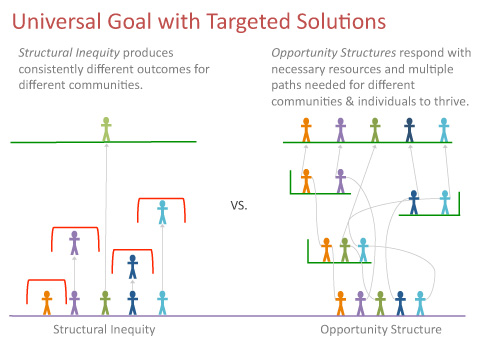A New Approach to Diversity, Equity and Inclusion at Citizen Schools
The development of a more diverse, equitable and inclusive organization has long been a priority at Citizen Schools, given our mission and the communities we serve. We strongly believe that as it is our moral imperative to breakdown the systems of oppression that have long prevented us from educating well our nation’s young people and supporting their visions of success.
Starting in 2002, our organization's leadership has annually developed tactics, goals and metrics connected to this work and we have made some progress against these goals. However, this incremental progress is insufficient given the clear business case for diversity, the urgency of our work and the context in our country. There are no excuses here. We simply have not done enough to recognize how our foundational systems and structures have been embedded in white supremacy culture and the barriers this creates in serving well our students. We have not done enough to dismantle those same structures that have prevented us from truly creating a place that inclusive of our staff, community, partners and most importantly allows us to provide an equitable and engaging learning experience for our students.
Last spring, we committed to the development of a multi year Diversity, Equity and Inclusion strategy. The strategy has three overarching priorities:
Recruit, develop and retain a diverse community of educators (staff, volunteers and partners) who reflect the communities we serve, embrace our values, and demonstrate a commitment to our students success.
Develop culturally responsive curriculum, tools and resources to support student learning, growth and exploration.
Codify policies, practices and communication protocols that support staff in creating an inclusive and equitable learning experience for students.
We will employ the targeted universalism (TU) framework to develop this strategy . In TU, organizations establish one universal goal that everyone is working towards but differentiate the strategies that different subgroups will use to reach this goal. This model helps communities achieve equity by paying particular attention to what supports the marginal groups require to reach the ultimate goal. We’re most excited about TU because is a model that allows us to bridge communities and promotes inclusion by strengthening and sustaining equitable practices, policies and programs.
The starting point for this work at Citizen Schools has been a close examination of our historical data, our mindsets and behaviors, our capacity for change and collaboration from internal and external members of our community. We recognize this a major undertaking that will require a collective commitment to creating a different culture that promotes inclusion, values diversity and leads for equity. We are ready and excited for the challenge and humbled by the opportunity to develop equitable policies and practices that demonstrate a culture of belonging in our organization and enables us to support our young people’s learning, growth, and success in our program and in their lives.

